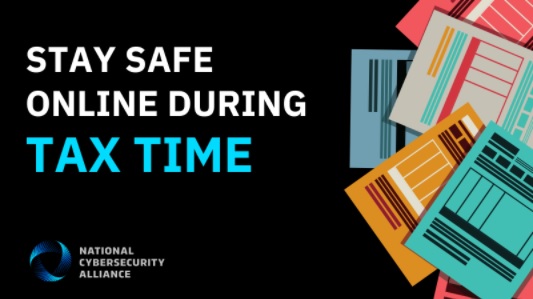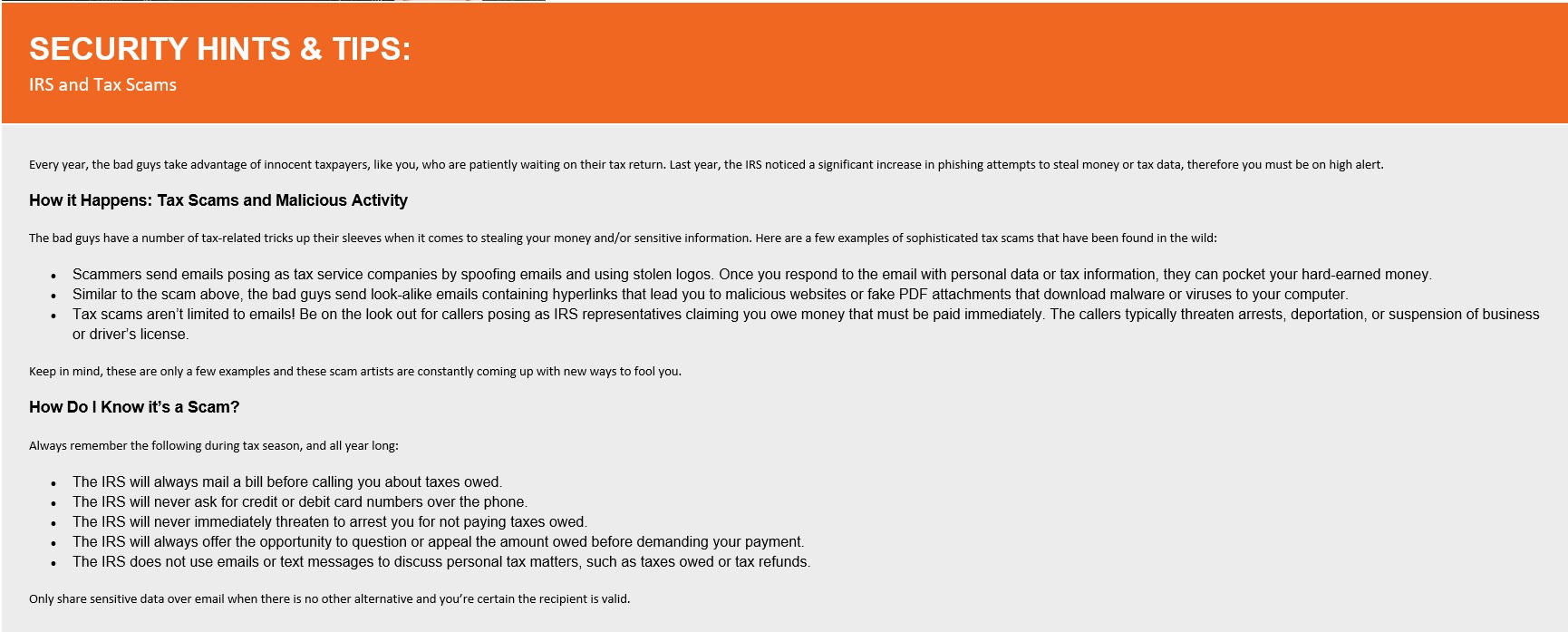
Grants and Financial Scams
Security Notices
ITS Warning: “Office of Financial Aid” Phishing email
March 7, 2025
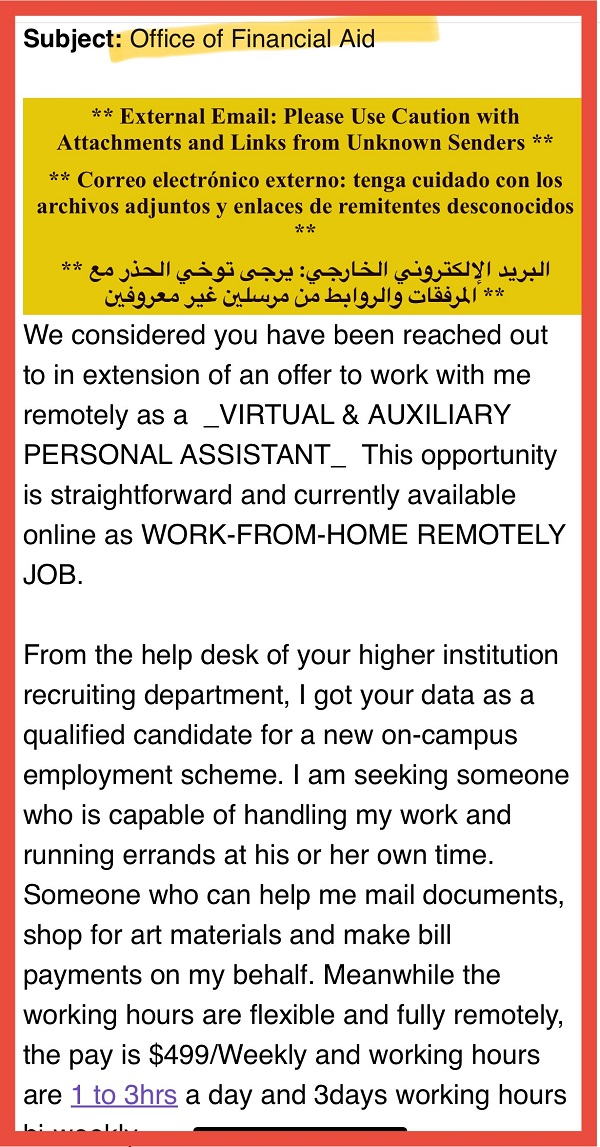
This email is a phishing attempt. Please report it using the PhishAlert button, forward it to spamFREEHUDSONCOUNTYCOMMUNITYCOLLEGE, or delete it. If you’ve interacted with the email, contact the Help Desk immediately.
ITS Warning: “Reminder: [Past due fee].” Phishing Email
August 9, 2024
This email is a phishing attempt. Please report it using the PhishAlert button, forward it to spamFREEHUDSONCOUNTYCOMMUNITYCOLLEGE, or delete it. If you’ve interacted with the email, contact the Help Desk immediately.
ITS Warning: 2024 Salary Improvements and Health Benefits For Faculty and Academic Staff
March 19, 2024
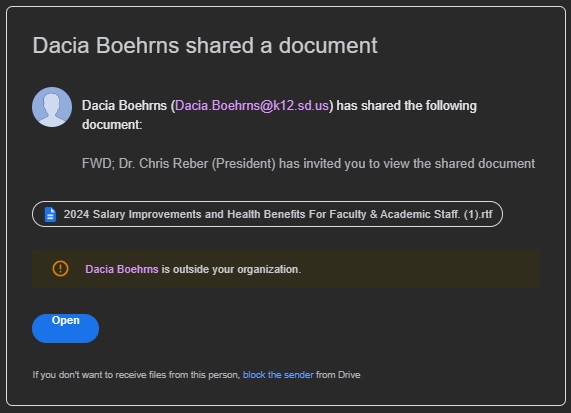
If you have received the attached email please report it with Phish Alert or delete it. If you’ve interacted with the link, contact the Help Desk immediately.
ITS Warning: January 2024 Faculty and Staff Salary Hike Scrutiny - Scam Email
December 18, 2023
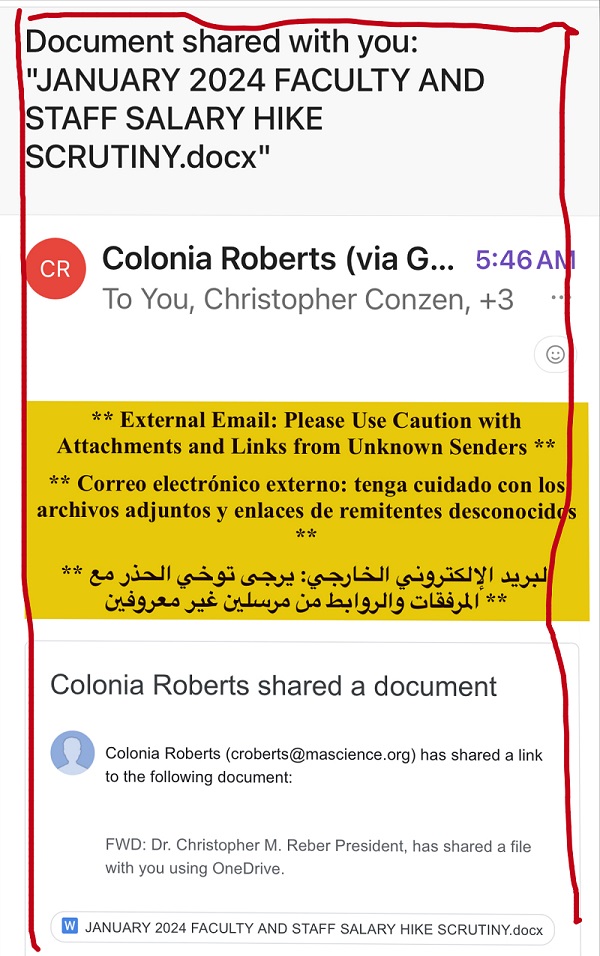
If you have received the attached email please report it with Phish Alert or delete it. If you’ve interacted with the link, contact the Help Desk immediately.
ITS Warning: "EAP - Benefits Program" Phishing Email
December 8, 2023
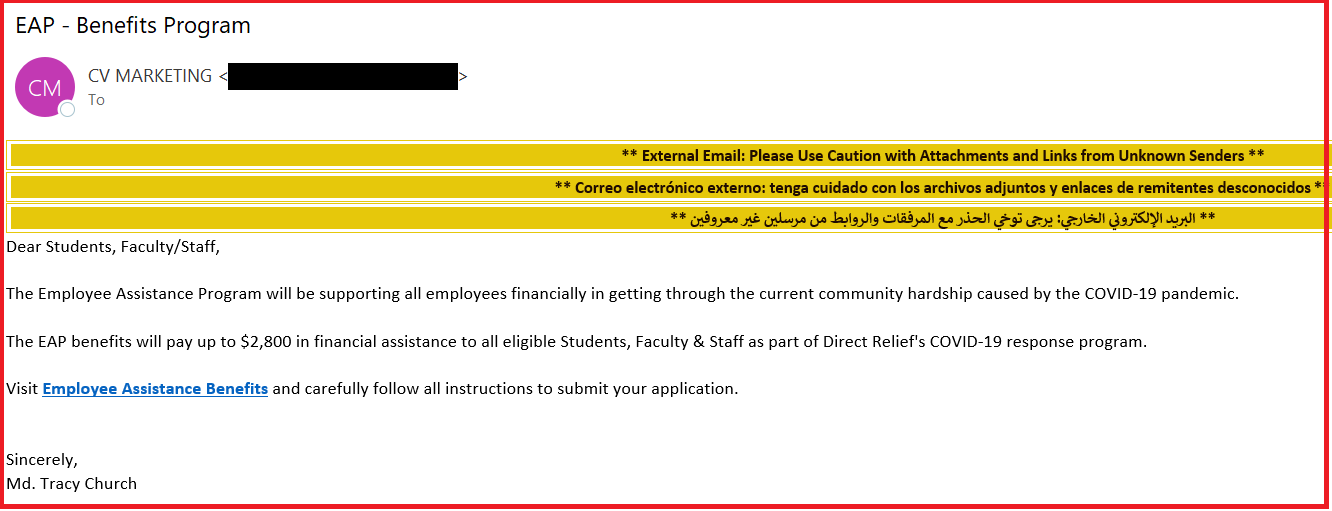
An email with the subject "EAP - Benefits Program" is a phishing email. If you have received the attached email please report it with Phish Alert or delete it. If you’ve interacted with the link, contact the Help Desk immediately.
ITS Warning: Phishing - Document shared with you: "2023 Salary Adjustments and Health Benefits For Faculty & Academic Staff Accepted by The Administrative Board."
September 8, 2023
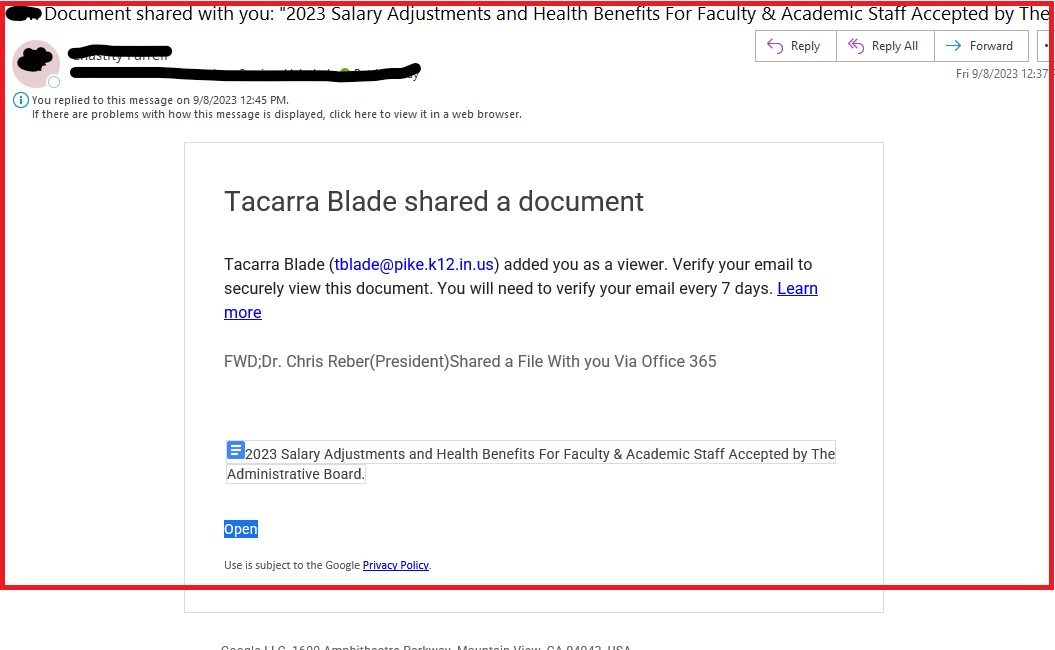
If you have received the following email, please report it with the PhishAlert button or delete it. If you have interacted with this email or the Google Doc, please contact the Help Desk immediately.
BBB Tip: Student loan forgiveness is here. Here’s how to avoid scams:
September 7, 2022
By Better Business Bureau.
Please be aware of scammers who will contact you and attempt to either phish you or trick you into paying them. The Student Loan Forgiveness program is a free government program. You do not need to pay any organization for student loan forgiveness. The Better Business Bureau has provided tips to avoid these scams:
Tips to avoid student loan forgiveness scams
- Get to know the terms of your student loan and the relief program before acting. Always do your research before sharing personal information. Be sure to understand the ins and outs of your specific loan, as well as how student loan relief impacts you. You may have to research who your current loan servicer is, since it may have changed. Go straight to official government websites, such as ED.gov and studentaid.gov, for information.
- Never pay money for a free government program. Scammers often trick victims into paying for free government programs – or they claim you can get additional benefits, faster benefits, etc., for a fee. A real government agency will not ask for an advanced processing fee. These are all red flags of a scam.
- Be wary of out-of-the-blue calls, emails or text messages claiming to be from the government. In general, the government will not contact you using these methods unless you grant permission.
- Watch out for phony government agencies or programs. If you speak to someone claiming to be a government representative who is offering you student loan relief, do some research before you agree to anything. Scammers often make uplook-alike government websites that sound similar to legitimate agencies or programs.
- Think something seems suspicious? Reach out to the agency directly. If you have any concerns about an alleged government representative's legitimacy, hang up the phone or stop emailing/texting. Then, find the official contact information (look on ED.gov and studentaid.gov or other official sites) and call to verify. Then, report the suspicious calls or messages.
- Be careful, even if the information comes from a friend. Even if a close friend or family member you trust sent you the information regarding student loan relief, make sure the claims are real first. During the COVID-19 pandemic, BBB received many reports of hacked social media accounts being used to spread government impostor scams.
ITS Warning: PAYCHECK ACCOUNT UPDATE Email is Fraud
July 5, 2022
If you received a similar email to that below, please report it with the Phish Alert button or delete it.
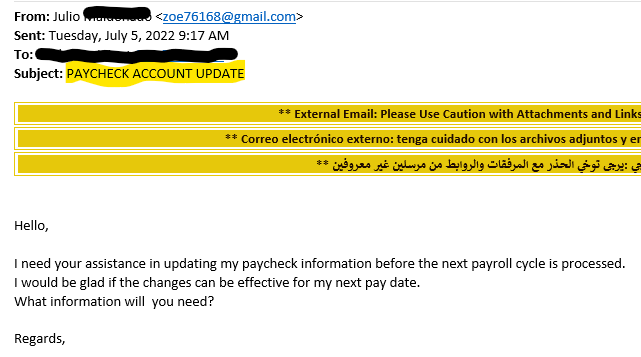
ITS Warning: PDF Phishing Email
June 6, 2022
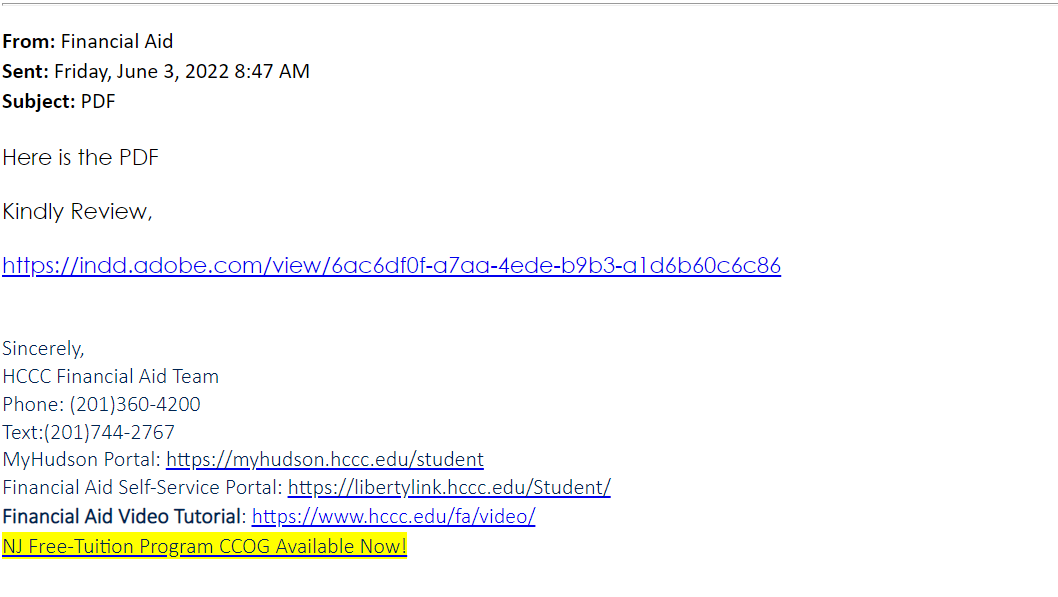
If you have received the PDF email, you should delete it immediately. This is a phishing email. If you have interacted with this link, please contact the Help Desk immediately.
Stay Safe Online During Tax Time
March 16, 2022
ITS Warning: DreamSpring Pandemic Grant Fraud Email
March 7, 2022
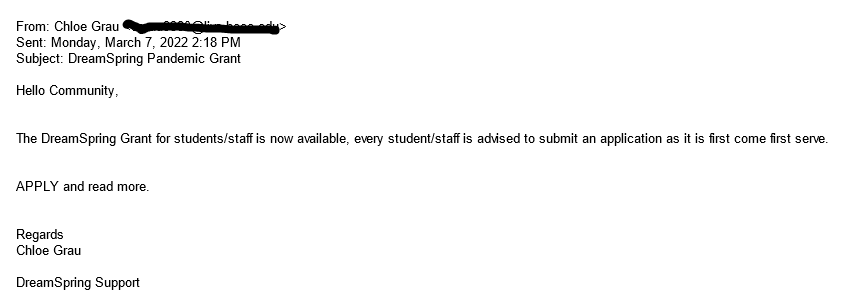
If you have received the following DreamSpring fraud email, please report it via Phish Alert Button or delete it. If you received the email and interacted with it or the sender, contact the ITS Help Desk.
Avoid IRS SCAMS!
February 10, 2022
Man Loses $2,800 After Fraudster Impersonates His Bank
February 3, 2022
Norton Store Scam
September 16, 2021
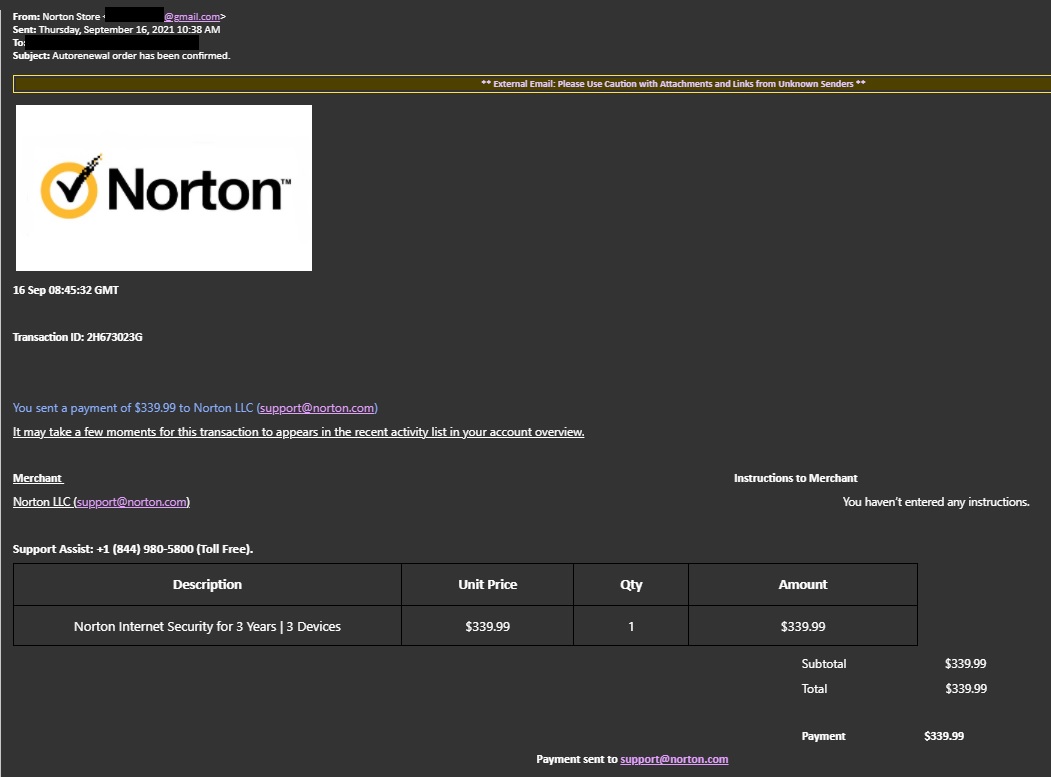
If you receive an email from "Norton Store" but the email is being sent from a suspicious gmail account, stating transactions and payments, this is an attempt at fraud. Please delete the email. If you have interacted with the link, please contact the Help Desk at (201) 360-4310.
Pandemic Grant Fraud
August 9, 2021
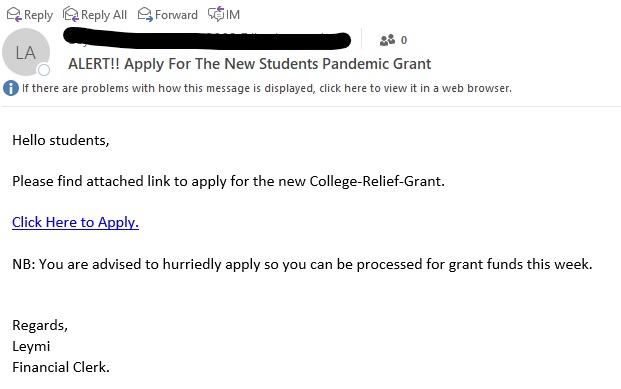
The message "ALERT!! Apply For The New Students Pandemic Grant" is an attempt at fraud. If you have interacted with this site, please contact the Help Desk at itshelpFREEHUDSONCOUNTYCOMMUNITYCOLLEGE or 201-360-4310.
Claim Your Stimulus Bonus Fraud
August 6, 2021
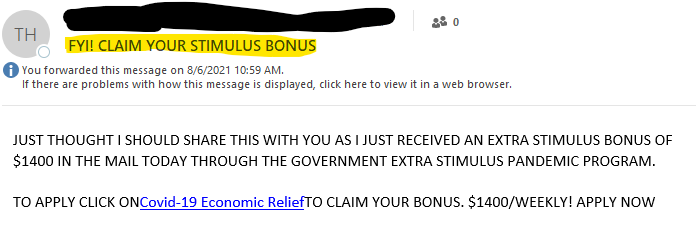
The message "FYI! CLAIM YOUR STIMULUS BONUS" is an attempt at fraud. If you have interacted with this site, please contact the Help Desk at itshelpFREEHUDSONCOUNTYCOMMUNITYCOLLEGE or 201-360-4310.
Pell Pandemic Grant / FAFSA Scam
June 29, 2021

Students may receive an email and text message regarding Pell grants or other COVID aid. These messages do not come from staff at HCCC. Please immediately delete these emails. If you have interacted with the link or email, please contact the Help Desk at (201) 360-4310.
Fraudulent "Grant Aid" ot "Grant Approval" Communications
February 4, 2021
Students may receive an email and text message regarding Pell grants or other COVID aid. These messages do not come from staff at HCCC. You may receive a text message and an email. The text message looks like this:
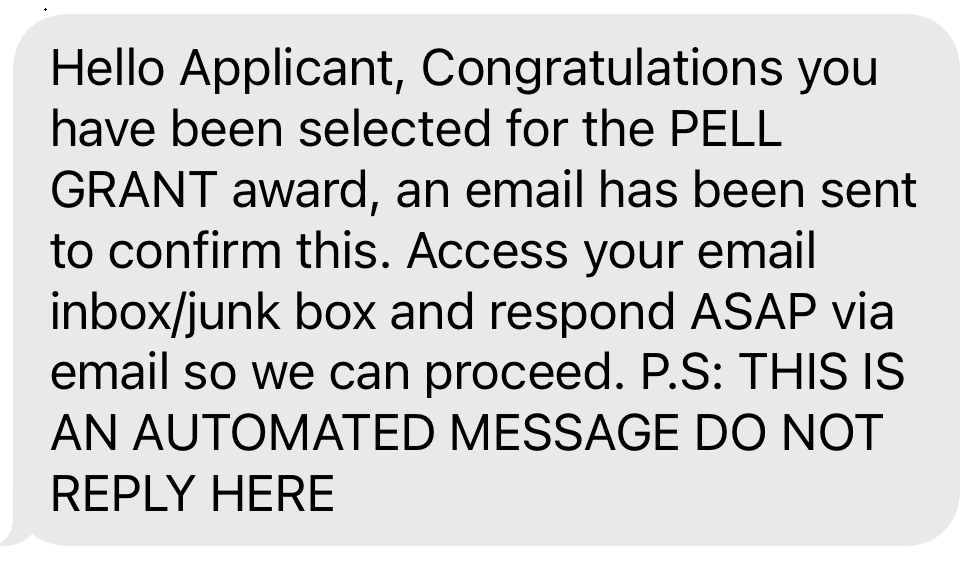
The email looks like this:
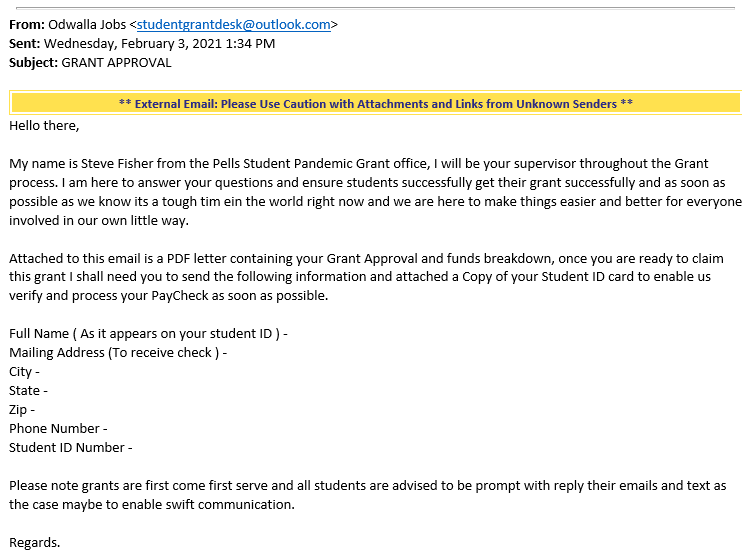
Students may be sent a PDF that seems to come from an official agency. The header may look like this:
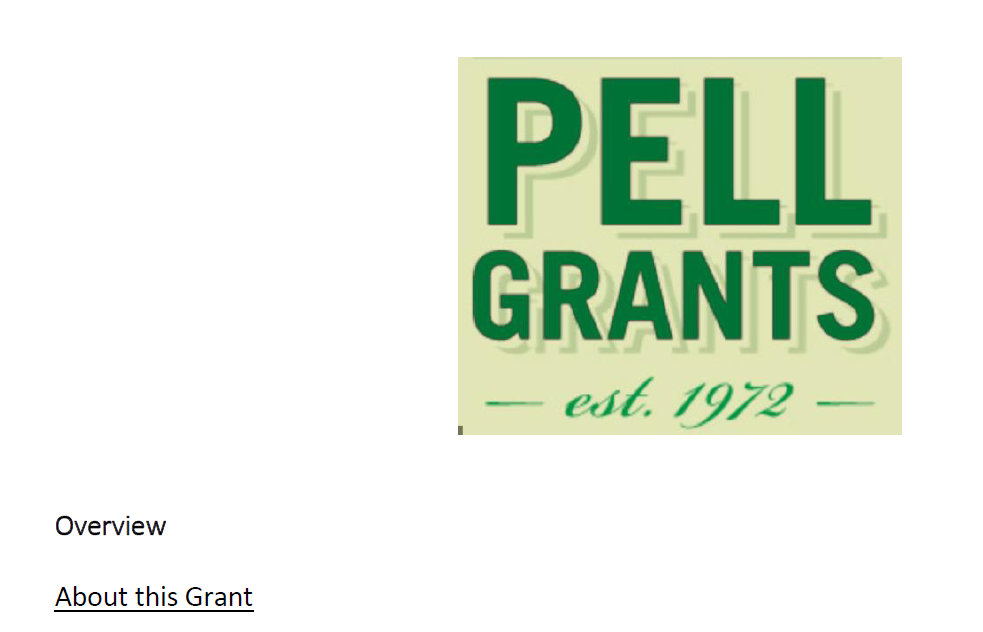
Some of the text to look out for is here:
The Pell Pandemic Grant is organized by the World Health Organization grants for students attending college or career schools. Most types of grants, unlike loans, are sources of free money that generally do not have to be repaid. Pell is supporting schools as they – while responding to the COVID-19 pandemic – continue to deliver impact through existing grants, develop quality new grants for the 2020-2022 allocation period and strengthen health systems. Up to US$500 million is available through these grant savings and reprogramming.
None of the information provided in these messages is correct. For information about CARES Funding and other Financial Aid:
- Please refer to https://www.hccc.edu/paying-for-college/financial-aid/cares-act.html for information regarding HCCC CARES Act Emergency Financial Aid Grants
- You will find the HCCC CARES Application link at https://www.hccc.edu/paying-for-college/financial-aid/cares-act.html
- If an email will go out to students regarding CARES Act application, the school's CARES Act flyer will always be attached and it should come from HCCC Financial Aid Office.
If you have received these messages and have provided any information, please contact the Help Desk.
CARES Pandemic Grant for Students Fraud
February 2, 2021
An email with the subject including "CARES Pandemic Grant for Students" is fraudulent. The email looks like this:
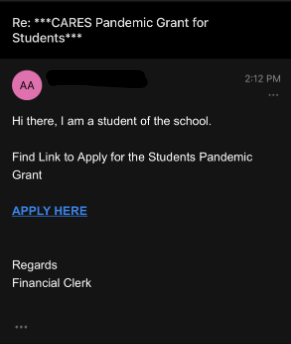
The site that it links to is not hccc.edu. The link may vary, but could be pellgrantshub dot weebly dot com and look like this:
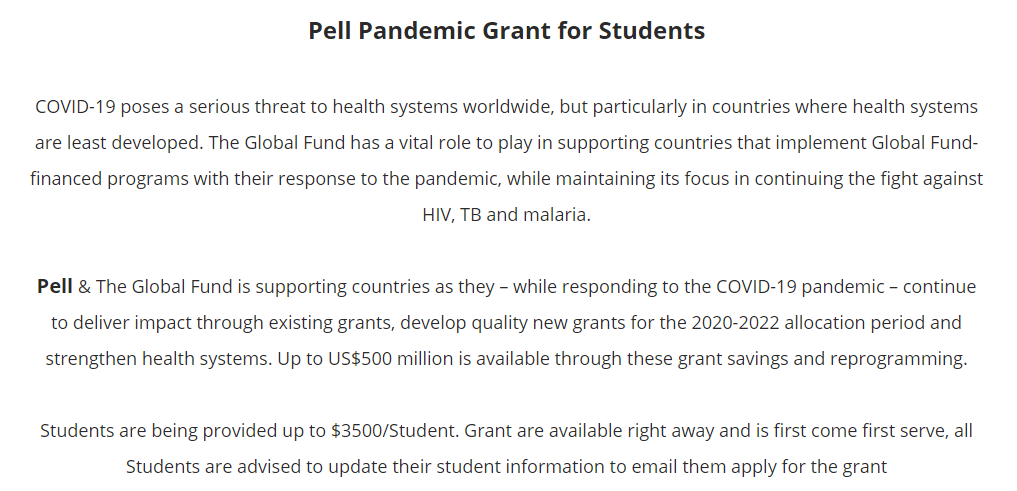
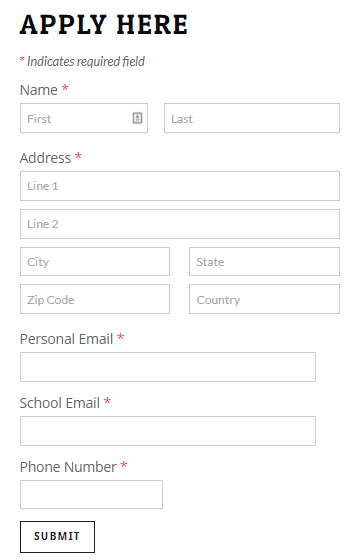
Please delete this email immediately. If you filled out this form, contact the Help Desk.
Grants Voicemail Scam
July 15, 2020
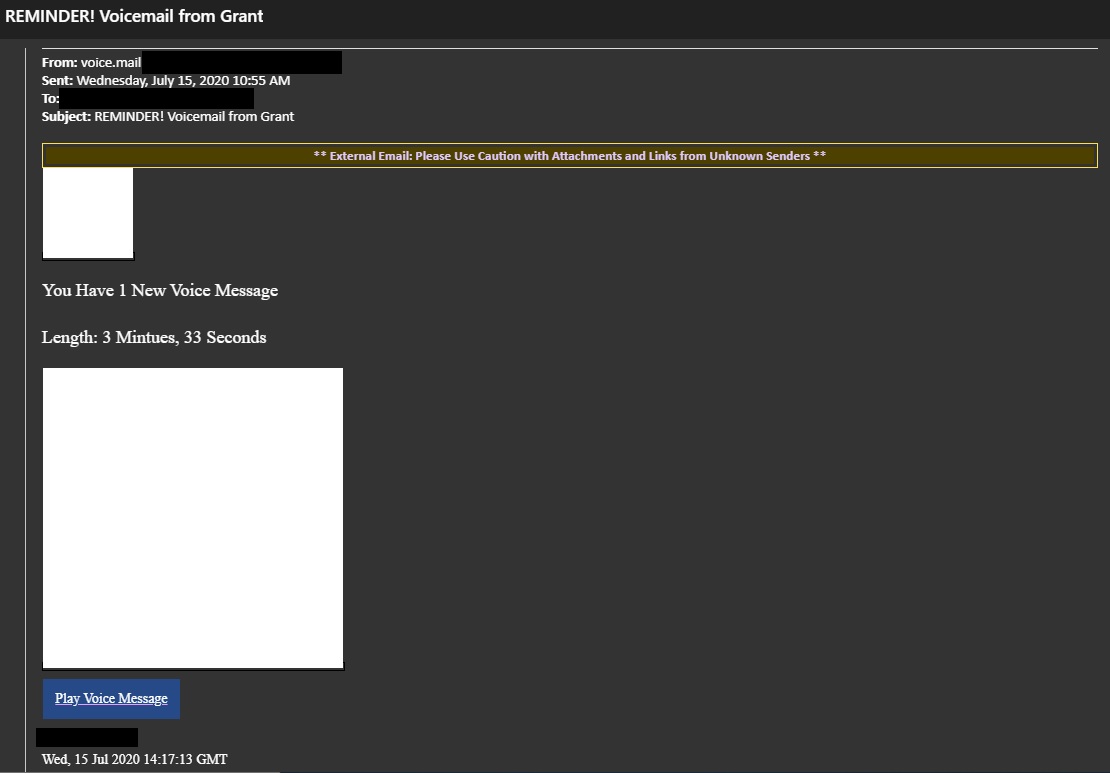
If you receive an email claiming to be from HCCC Grants and stating you have an unread voicemail, DO NOT open the voice message, for this is a phishing attempt. If you have interacted with this email address, contact the ITS Help Desk for assistance.
COVID-19 Stimulus Scams
March 31, 2020
Bank Information Scam
January 14, 2020

If you receive an email from Patricia Clay with an incorrect email, and is requesting to make an update on bank information, please delete the message immediately for this is a phishing attempt. If you have contacted this person, please reach out to the Help Desk.
Payroll Direct Deposit Scam
January 8, 2020

If you receive an email from someone regardless of who is requesting to make a change in their payroll direct deposit account or any other related requests, please delete the message immediately for this is a phishing attempt. If you have contacted this person, please reach out to the Help Desk.
Salary Increase Scam
October 23, 2019
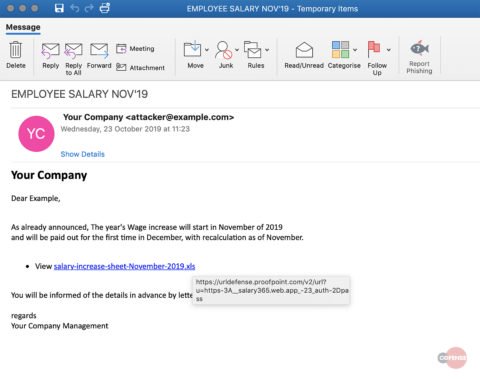
Image Credits: Cofense
Source: https://www.bleepingcomputer.com/news/security/office-365-phishing-campaign-baits-employees-with-pay-raises/
If you receive an email with a subject that contains anything related to employee salary, immediately delete the email and do not click the link that it provides, for this is a phishing attempt to steal your information. If you clicked a link or interacted with the email, please contact the Help Desk.
Invoice Scam
September 24, 2019
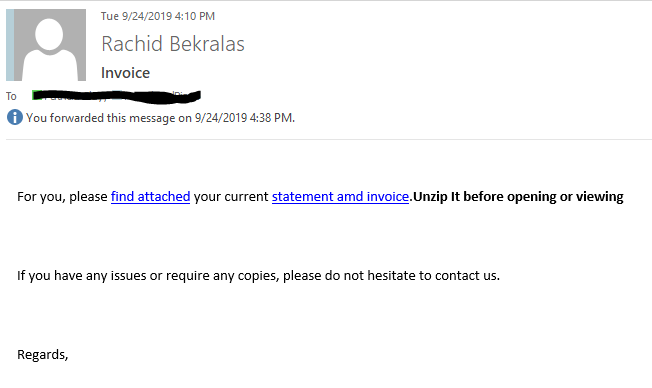
An email with the subject "Invoice" is a phishing attempt. The body of the message directs the use to follow a link to access an invoice. Delete the message upon receipt. If you followed the link, please contact the Help Desk.
Bank of America Scam
June 4, 2019
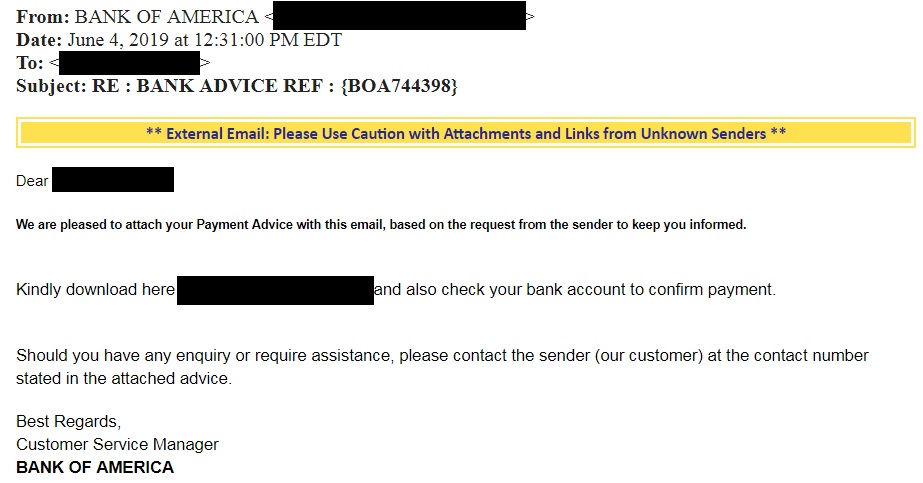
If you receive an email stating it is from Bank of America with a Payment Advice, and are asked to download to confirm payment, immediately delete it and do not open any attachments or links for this is a phishing attempt. If you clicked a link or interacted with the email, please contact the Help Desk.
Payment Voucher Scam
May 30, 2019
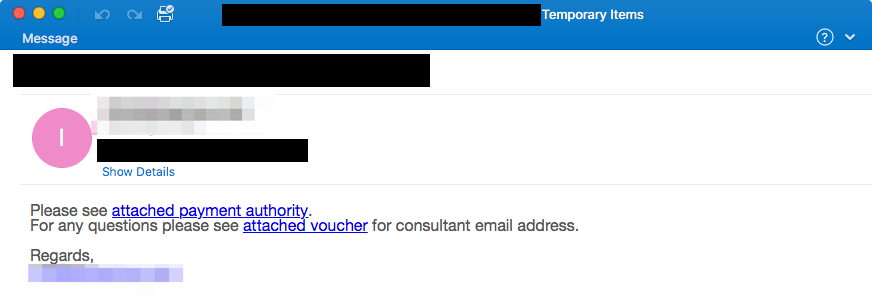
If you receive a payment voucher malicious email, immediately delete it and do not open any attachments for this is a phishing attempt. If you interacted with the email, please contact the Help Desk.
The URLs delivered with these emails include a link to a zip file containing a Microsoft Word document. If the user enables macros in the Microsoft Word document, it will download and install the Trickbot banking trojan, which can download additional modules and deploy new capabilities. Threat actors utilize the Google Docs URLs because it is a known and authentic site, helping to create an image of legitimacy to email content filters and the unsuspecting target.
Government BoD Scam
May 22, 2019
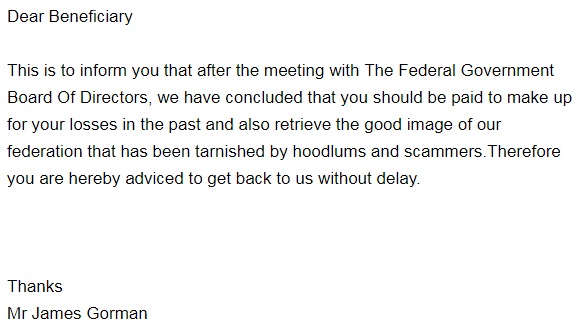
If you receive an email claiming they are from The Federal Government Board of Directors, and are asked to get back to them without delay, do not attempt to do so for this is a phishing attempt. The email is fraudulent and should be deleted immediately.
Contact Information
Information Technology ServicesJournal Square Campus
Patricia Clay
Associate Vice President for Technology and Chief Information Officer
70 Sip Avenue - 3rd Floor
Jersey City, NJ 07306(201) 360-4310
itshelpFREEHUDSONCOUNTYCOMMUNITYCOLLEGE
computerlabsFREEHUDSONCOUNTYCOMMUNITYCOLLEGE
North Hudson Campus
4800 John F. Kennedy Blvd - 3rd Floor
Union City, NJ 07087(201) 360-4309
itshelpFREEHUDSONCOUNTYCOMMUNITYCOLLEGE
![ITS Warning: “Reminder: [Past due fee].” Phishing Email ITS Warning: “Reminder: [Past due fee].” Phishing Email](/administration/resources/images/phish-bowl-past-due-fee.jpg)
